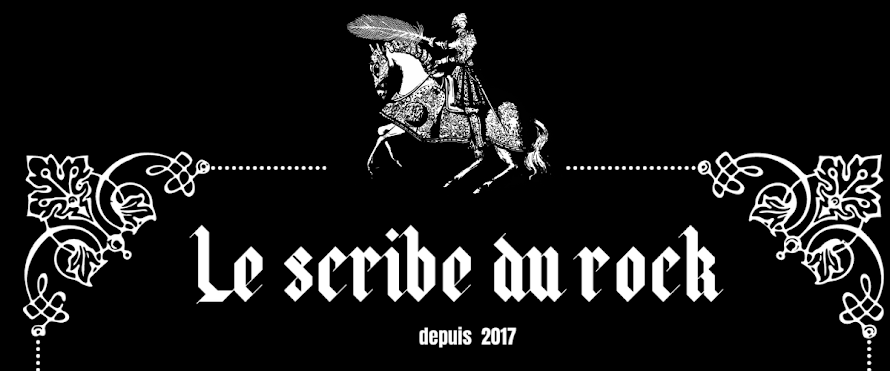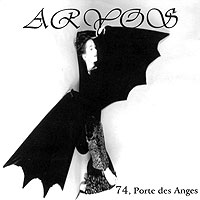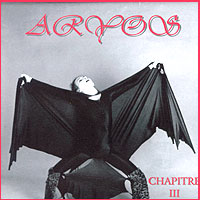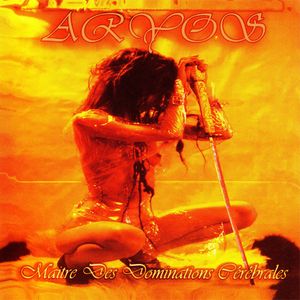INTERVIEW AVEC NAPHARION
"Si Aryos était un proverbe il serait imprononçable"
Depuis 1994 Aryos déploie un Black Metal des plus singuliers et irrésistible qui soit. Venus de nouvelle aquitaine, les gardiens de la flamme noire nous font ici l'honneur d'une interview qui est à la fois un plaisir et une rareté. Merci à Napharion, mage et devin mais également vocaliste de cette congrégation occulte de nous rappeler ce qu'est le Black Metal, et ce que les arts noirs représentent pour ceux qui savent. Hail Aryos !
Vous êtes originaires de ce qu’on appelle aujourd’hui la Nouvelle-Aquitaine (pourquoi, il y en avait une ancienne ?). Et vous n’êtes pas ce que l’on peut appeler des « perdreaux de l’année » puisqu’Aryos existe depuis 1994. Peux-tu nous relater la formation du groupe, et les objectifs qui étaient les vôtres à l’époque ?
Napharion : Au départ, le groupe s’appelait FORLORN. On jouait du Black Metal classique et crasseux, puis la musique a évolué vers un Dark Atmosphérique, toujours Black Metal, mais avec une tension vers l’avant-garde et des influences comme les premiers TIAMAT. On a fait quelques concerts locaux et sortis des K7 rehearshal confidentielles. Le groupe a connu plusieurs changements de line up et nous sommes devenus ARYOS. Notre but était déjà de jouer du Metal Sombre, Extrême et Ésotérique, mais tout a évolué et s’est peaufiné avec le temps… Comme tu peux l’imaginer, il y a une nette différence entre les rêves et les objectifs d’un gamin de 15 ans et ceux d’un gamin de 40.
Vous sonnez de façon unique. Le chant, notamment, fait penser à celui d’une sorcière ou d’un sorcier, et musicalement vous possédez une richesse d’influences qui vont bien au-delà du Metal. Peux-tu nous en parler ?
Napharion : Il est primordial, selon moi, d’entrer dans un état, pour ainsi dire, de possession. Crier ou grogner bêtement dans un micro n’a aucun intérêt. Il faut atteindre une forme de transe et faire entrer le « daimon » en toi. Musicalement, Aryos va chercher ses influences dans le Metal, principalement celui des années 80/90, mais également dans divers courants sombres, underground ou mainstream peu importe, au final nous jouons du Black Metal, mais nous n’hésitons pas à tisser dans notre musique ce qui nous inspire.
J.S: Forcement si tu écoutes plein de choses, ces influences ressortent inconsciemment dans tes compositions. Si tu n’écoutes qu’un style, tu ne pourras retranscrire qu’un style.
Vous êtes un groupe profondément « religieux ». Peux-tu nous parler de votre approche de l’art noir, de l’occultisme et de la spiritualité ? Ta pratique des arts divinatoires ?
NAPHARION : Je saute des paradigmes dans les flammes de Lucifer. Durant longtemps, les états les plus sordides m’apportaient de la lumière, et j’ai vagabondé, j’ai cherché des clés dans des océans… Entrevoir ce se trouve derrière certaines portes t’impose des stigmates, te hante ; ces expériences peuvent être bouleversantes ou aliénantes. Avec les années, j’ai pris conscience — du moins j’ai essayé — de la réalité alternative.
74, porte des anges, votre premier EP en 2000 sonne de façon incroyable, avec notamment ces passages de piano « classique » qui renvoient à Debussy et Chopin. Je trouve que cela renforce le côté satanique de l’ensemble. Peux-tu nous dire un mot de cet EP ?
NAPHARION : Je ne considère pas 74, porte des anges comme un EP, mais plutôt comme une démo, avec tous les défauts et surtout l’immaturité que ce genre de démarche quelque peu brouillon, peut impliquer, que ce soit au niveau des paroles, de la musique ou de la production. Je n’aime pas cette période d’Aryos et je n’ai pas tellement envie de m’étendre là-dessus. Pour moi, le groupe a vraiment démarré à partir de son troisième enregistrement : « Chapitre III ».
Quels groupes vous ont influencé ? Quels auteurs ?
NAPHARION : Chaque personne impliquée dans Aryos, a apporté ses propres influences musicales, artistiques, émotionnelles spirituelles. Les sources sont donc multiples. Nous ne nous imposons aucune limite de genre ni d’influence.
Cette interview sera publiée dans un livre qui va traiter des différents courants du BM, y compris les plus récents (Post…). Quelle est ta vision de l’évolution du genre sur toutes ces années ?
D’un côté il semble y avoir des gens qui veulent absolument sonner comme les premiers Darkthrone et de l’autre des groupes qui sonnent davantage Post-Rock ou Hardcore que Black. Au milieu il y a des groupes comme Aryos, qui sonnent… comme Aryos. Qu’en penses-tu ?
....................
Napharion : Tous les courants artistiques doivent évoluer, muter se transformer. Il serait vraiment antinaturel de figer le genre, cependant je pense que certains sous-courants actuels sont abusivement assimilés à du Black Metal. Et, dans tous les cas je ne dirai pas qu’Aryos se trouve « au milieu », plutôt qu’Aryos se trouve ailleurs.
J.S: On joue à notre façon. Si un morceau mêle guitare et violon, ou comporte des nappes de synthés jazzy, c’est qu’on l’aura choisi. Et à la fin ça fait du Aryos. Aucun de nous ne ressent le besoin de demander sa validation au saint True Black Metal. Les tiroirs n’existent que pour les labels qui doivent classer leurs groupes — et pour les lemmings.
Avec l’album Maître des dominations cérébrales (quel titre !) en 2004, vous continuez votre exploration d’un BM profondément occulte et singulier. Peux-tu nous parler de cet album ? Dans quelles conditions fut-il réalisé ?
Napharion : Je me souviens de blessures et de Haine, d’incantations sous une lune noire, de serpents rampants, d’insectes. Cet album fut une œuvre nécessaire et majeure où tous les acteurs se dévouèrent à servir l’entité. L’enregistrement du morceau « En lune noire » fut particulièrement marquant — on n’était clairement pas seuls ce jour-là.
Votre liberté musicale apparaît comme illimitée, qu’en est-il ? Vous fixez vous des bornes ?
Napharion : Se fixer une limite est contraire au principe de la création.
À l’instar d’un Vindsval de BAN vous semblez ne pas vouloir laisser le BM stagner, ce qui est sans doute la meilleure façon de le faire vivre, non ?
Napharion : Je ne connais pas Vindsval personnellement. Il fait son truc et c’est ce qu’il fait de lui un grand artiste et un visionnaire. Mon point est que le Black Metal ne vit plus depuis longtemps : la vulgarisation du genre l’a détruit. Mais Aryos n’a pas pour finalité de faire revivre quelque chose. Nous préférons rester discrets, nous traçons notre chemin sans nous soucier de toutes ces mascarades qui ressemblent fort, par moments, à une grande farce orchestrée par des imposteurs.
"L’entité Aryos fait elle-même le ménage et écarte ceux qui ne peuvent plus servir les anciens dieux"
Votre son a encore évolué avec l’EP Prophétie Acide en 2011, avec l’arrivée de sonorités électroniques et de claviers aux aspects « progressifs » (je pense parfois aux vieux King Crimson ou le Yes des débuts). Le piano semble « disparaître » alors. Peux-tu nous relater les divers événements qui ont conduit à ce changement ?
Napharion : Le claviériste de l’époque a ressenti une approche plus « indus », avec en effet des influences Prog 70’. Ce n’était pas un calcul, mais le résultat fut en adéquation avec ce que nous voulions capter dans cet EP. À noter qu’il fut réalisé dans une période bien sombre, avec un line-up en pleine crise.
Vous mêlez, on l’a dit, Black Metal et expérimentations, mais aussi avec du Death et du Doom, quels sont les groupes dans ces courants qui trouvent vos faveurs ?
Napharion : Le « vrai » Death Metal de la fin des années 80 et du début des années 90 nous a marqués, comme beaucoup de notre génération, notamment la scène américaine, Possessed, Death, Deicide, Morbid Angel, Nocturnus… Ou des groupes suédois comme entombed, français comme Massacra, Catacomb et bien d’autres — il serait impossible de dresser une liste exhaustive. En matière de Doom, c’est pareil, on apprécie aussi bien Black sab que Candlemass et d’autres.
Vous avez souvent changé de label. À quoi est-ce dû ?
Napharion : Aucune idée.
Vous avez sorti en 2015 l’excellent Les Stigmates d’Hécate sur EXU REI RECORDS (putain de label au passage !) avec toujours cette unicité et cette variété, et vous arrivez à sonner encore différemment. Le line-up change à partir de cet album, que s’est-il passé ? Aucun de vos disques ne se ressemble, mais pourtant ça reste Aryos !
Napharion : L’entité Aryos fait elle-même le ménage et écarte ceux qui ne peuvent plus servir les anciens dieux. Aussi douloureux que cela pu être ce changement fut bénéfique. Aryos n’avait que deux options : splitter ou tenir le coup. La fin du groupe aurait constitué un échec personnel à la fois spirituel et artistique, il fallait que je continue pour prouver ma dévotion et nourrir cet égrégore. J’ai donc contacté mon ami J. S., qui a accepté de nous rejoindre et ce fut un nouveau souffle. L.V.C., batteur légendaire de la scène toulousaine accepta également d’intégrer le line up. Les Stigmates d’Hécate marque une renaissance. Tout en conservant la démarche originelle du groupe, cet album nous a permis d’aller plus loin, et constitue, à ce jour ce qu’Aryos aura fait de meilleur dans tous les aspects de son Art.
Bon, moi je suis mordu, je crois que ça se voit. Quelle est la suite du programme ? Y’a-t-il un nouvel album dans les tuyaux ?
Napharion : Nous savons que l’épreuve sera dure, spirituellement et artistiquement. Aryos n’est pas que de la musique, c’est un tout qui implique du sang, des larmes et de la dévotion. Aujourd’hui, je ne suis pas en mesure de te dire comment et quand nous serons de retour, mais ce sera en principe notre acte final.
Questionnaire de Proust : Si Aryos était un proverbe ?
Il serait imprononçable.
Votre objectif final ?
Accomplir l’acte final.
Ceci est un espace libre : dis ce que tu veux est la loi !
Merci à toi pour l’interview et pour ta dévotion, Hail Eris !
Merci Napharion
ARYOS LES STIGMATES D'HECATE
***
THE ENGLISH VERSION
***
"If Aryos were a proverb, he would be unpronounceable"
Since 1994 Aryos has been deploying one of the most singular and irresistible Black Metal there is. Coming from new Aquitaine, the guardians of the Black Flame do us the honour of an interview that is both a pleasure and a rarity. Thanks to Napharion, mage and diviner but also vocalist of this occult congregation to remind us what Black Metal is, and what Black Arts represent for those who know. Hail Aryos!
You come from what is now called New Aquitaine (why, there was an old one?). And you are not what we can call "partridges of the year" since Aryos has been around since 1994. Can you tell us about the formation of the group, and the objectives that were yours at the time?
Napharion: At first, the group was called FORLORN. We played classic and dirty Black Metal, then the music evolved into an atmospheric Darth, still Black Metal, but with a tension towards the avant-garde and influences like the first TIAMAT. We did some local concerts and came out of the K7 rehearshal confidential. The group had several line up changes and we became FYROS. Our goal was already to play Dark, Extreme and Esoteric Metal, but everything has evolved and been refined over time... As you can imagine, there is a clear difference between the dreams and objectives of a 15-year-old and a 40-year-old.
You sound unique. Singing, in particular, is reminiscent of a witch or a wizard, and musically you have a wealth of influences that go far beyond Metal. Can you tell us about it?
Napharion: It is essential, in my opinion, to enter a state of, so to speak, possession. Screaming or growling stupidly into a microphone is of no interest. You have to reach a form of trance and bring the "daimon" into you. Musically, Aryos will seek his influences in Metal, mainly in the 80s and 90s, but also in various dark currents, underground or mainstream whatever, in the end we play Black Metal, but we do not hesitate to weave in our music what inspires us.
J.S: Obviously if you listen to a lot of things, these influences come out unconsciously in your compositions. If you only listen to one style, you will only be able to transcribe one style.

You are a deeply "religious" group. Can you tell us about your approach to black art, occultism and spirituality? Your practice of the divinatory arts? NAPHARION: I jump from paradigms into the flames of Lucifer. For a long time, the most sordid states brought me light, and I wandered, I looked for keys in oceans... Sighting what lies behind certain doors imposes stigmas on you, haunts you; these experiences can be upsetting or alienating. Over the years, I have become aware - or at least I have tried - of the alternative reality.
74, porte des anges, your first EP in 2000 sounds incredible, with notably these "classical" piano passages that refer to Debussy and Chopin. I find that this reinforces the satanic side of the whole. Can you tell us a bit about this EP?
NAPHARION: I don't consider 74, carries angels as an EP, but rather as a demo, with all the defects and especially the immaturity that this kind of somewhat sketchy approach can imply, whether at the level of words, music or production. I don't like this period of Aryos and I don't really want to dwell on it. For me, the group really started from its third recording: "Chapter III".
Which bands influenced you? Which authors?
NAPHARION: Each person involved in Aryos has brought their own musical, artistic, emotional and spiritual influences. The sources are therefore multiple. We do not impose any gender or influence limits on ourselves.
This interview will be published in a book that will cover the different currents of the WB, including the most recent ones (Post...). What is your vision of the evolution of the gender over all these years?
On one side there seem to be people who absolutely want to sound like the first Darkthrone and on the other side bands that sound more Post-Rock or Hardcore than Black. In the middle there are groups like Aryos, which sound... like Aryos. What do you think of that?
....................
Napharion: All artistic trends must evolve, mutate and transform. It would really be unnatural to freeze the genre, but I think that some current sub-currents are abusively assimilated to Black Metal. And, in any case, I will not say that Aryos is "in the middle", rather than Aryos is elsewhere.
J.S: We play our own way. If a song mixes guitar and violin, or has layers of jazzy synths, it's because we chose it. And at the end it makes Aryos. None of us feel the need to ask for its validation from the holy True Black Metal. Drawers only exist for labels that have to classify their groups - and for lemmings.
With the album Master of Brain Dominance (what a title!) in 2004, you continue your exploration of a deeply occult and singular BM. Can you tell us about this album? Under what conditions was it carried out?
Napharion: I remember wounds and hatred, incantations under a black moon, creeping snakes, insects. This album was a necessary and major work in which all the actors devoted themselves to serving the entity. The recording of the song "En lune noire" was particularly striking - we were clearly not alone that day.
Your musical freedom seems unlimited, what about it? Do you set boundaries for yourself?
Napharion: Setting a limit is contrary to the principle of creation.
Like a Vindsval de BAN, you don't seem to want to let the BM stagnate, which is probably the best way to make it live, do you?
Napharion: I don't know Vindsval personally. He does his thing and that's what he makes him a great artist and a visionary. My point is that Black Metal has not lived for a long time: the popularization of the genre has destroyed it. But Aryos is not about bringing something back to life. We prefer to remain discreet, we trace our way without worrying about all these masquerades which at times look very much like a great joke orchestrated by impostors.
Your sound has further evolved with the EP Acid Prophecy in 2011, with the arrival of electronic sounds and keyboards with "progressive" aspects (I sometimes think of the old King Crimson or the Yes of the beginning). The piano seems to "disappear" then. Can you tell us about the various events that led to this change?
Napharion: The keyboard player of the time felt a more "industrial" approach, with indeed Prog 70' influences. It was not a calculation, but the result was in line with what we wanted to capture in this EP. It should be noted that it was made in a very dark period, with a line-up in the middle of a crisis.
As we have said, you mix Black Metal and experimentations, but also with Death and Doom, which groups in these currents find your favour?
Napharion: The "real" Death Metal of the late 80's and early 90's left its mark on us, as did many of our generation, including the American scene, Possessed, Death, Deicide, Morbid Angel, Nocturnus... Or Swedish bands like entombed, French like Massacra, Catacomb and many others - it would be impossible to make an exhaustive list. When it comes to Doom, it's the same thing, we appreciate Black sab as well as Candlemass and others.
You often changed labels. What is the reason for this?
Napharion: No idea.
In 2015, you released the excellent Les Stigmates d'Hécate on EXU REI RECORDS (a fucking label by the way!) with still this uniqueness and variety, and you manage to sound even different. The line-up changes from this album, what happened? None of your records look alike, but it's still Aryos!
Napharion: The Aryos entity cleans itself and removes those who can no longer serve the ancient gods. As painful as it may have been, this change was beneficial. Aryos had only two options: split or hold on. The end of the group would have been a personal failure both spiritual and artistic, I had to continue to prove my devotion and feed this egregore. So I contacted my friend J. S., who agreed to join us and it was a new breath. L.V.C., legendary drummer of the Toulouse scene also accepted to join the line up. The Hecate Stigmata marks a renaissance. While preserving the group's original approach, this album has allowed us to go further, and constitutes, to date, the best Aryos has ever done in all aspects of his Art.
Well, I'm bitten, I think you can tell. What is the next step in the program? Is there a new album in the pipes?
Napharion: We know that the ordeal will be hard, spiritually and artistically. Aryos is not just music, it is a whole that involves blood, tears and devotion. Today, I am not in a position to tell you how and when we will be back, but it will in principle be our final act.
Proust's Questionnaire: What if Aryos was a proverb?
It would be unpronounceable.
Your final objective?
Complete the final act.
This is a free space: say what you want is the law!
Thank you for the interview and for your devotion, Hail Eris!
Thank you Napharion














